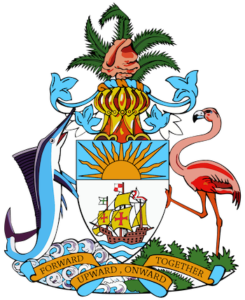
Coat of Arms
*On this date in 1973, the Bahamas gained independence from the United Kingdom. The Bahamas became a British crown colony in 1718.
After the American Revolutionary War, the Crown resettled thousands of American Loyalists to the Bahamas; they took their slaves with them and established plantations on land grants. African slaves and their descendants constituted most of the population from this period on. The slave trade was abolished by the British in 1807; slavery in the Bahamas was abolished in 1834. Subsequently, the Bahamas became a haven for freed African slaves. Africans liberated from illegal slave ships were resettled on the islands by the Royal Navy, while some African American slaves and Native American Seminoles escaped to the Bahamas from Florida.
Bahamians were even known to recognize the freedom of slaves carried by the ships of other nations that reached the Bahamas. Afro Bahamians make up 90% of the population of 332,634. Modern political development began after the Second World War. The first political parties were formed in the 1950s, split broadly along ethnic lines - the United Bahamian Party (UBP) representing the English-descended Bahamians (known informally as the 'Bay Street Boys') and the Progressive Liberal Party (PLP) representing the Afro-Bahamian majority.
A new constitution granting the Bahamas internal autonomy was enacted in January 1964, with Chief Minister Sir Roland Symonette of the UBP becoming the first Premier. In 1967, Lynden Pindling of the PLP became the first Black Premier of the Bahamian colony; in 1968, the position title was changed to Prime Minister. In 1968, Pindling announced that the Bahamas would seek full independence. A new constitution giving the Bahamas increased control over its affairs was adopted in 1968. In 1971, the UBP merged with a disaffected faction of the PLP to form a new party, the Free National Movement (FNM), a de-racialized, center-right party that aimed to counter the growing power of Pindling's PLP.
The British House of Lords voted to give the Bahamas independence on June 22, 1973. Prince Charles delivered the official documents to Prime Minister Pindling, declaring the Bahamas a fully independent nation on July 10, 1973. It joined the Commonwealth of Nations on the same day. The Bahamas' booming economy made it a beacon for immigrants, most notably from Haiti. In 1992, Pindling was unseated by Hubert Ingraham of the FNM. Ingraham went on to win the 1997 Bahamian general election before being defeated in 2002 when the PLP returned to power under Perry Christie. Ingraham returned to power from 2007 to 2012, followed by Christie again from 2012 to 17.
With economic growth faltering, Bahamians re-elected the FNM in 2017, with Hubert Minnis becoming the fourth prime minister. In September 2019, Hurricane Dorian struck the Abaco Islands and Grand Bahama at Category 5, devastating the northwestern Bahamas. The storm inflicted at least US$7 billion in damages and killed over 50 people, with 1,300 still missing.